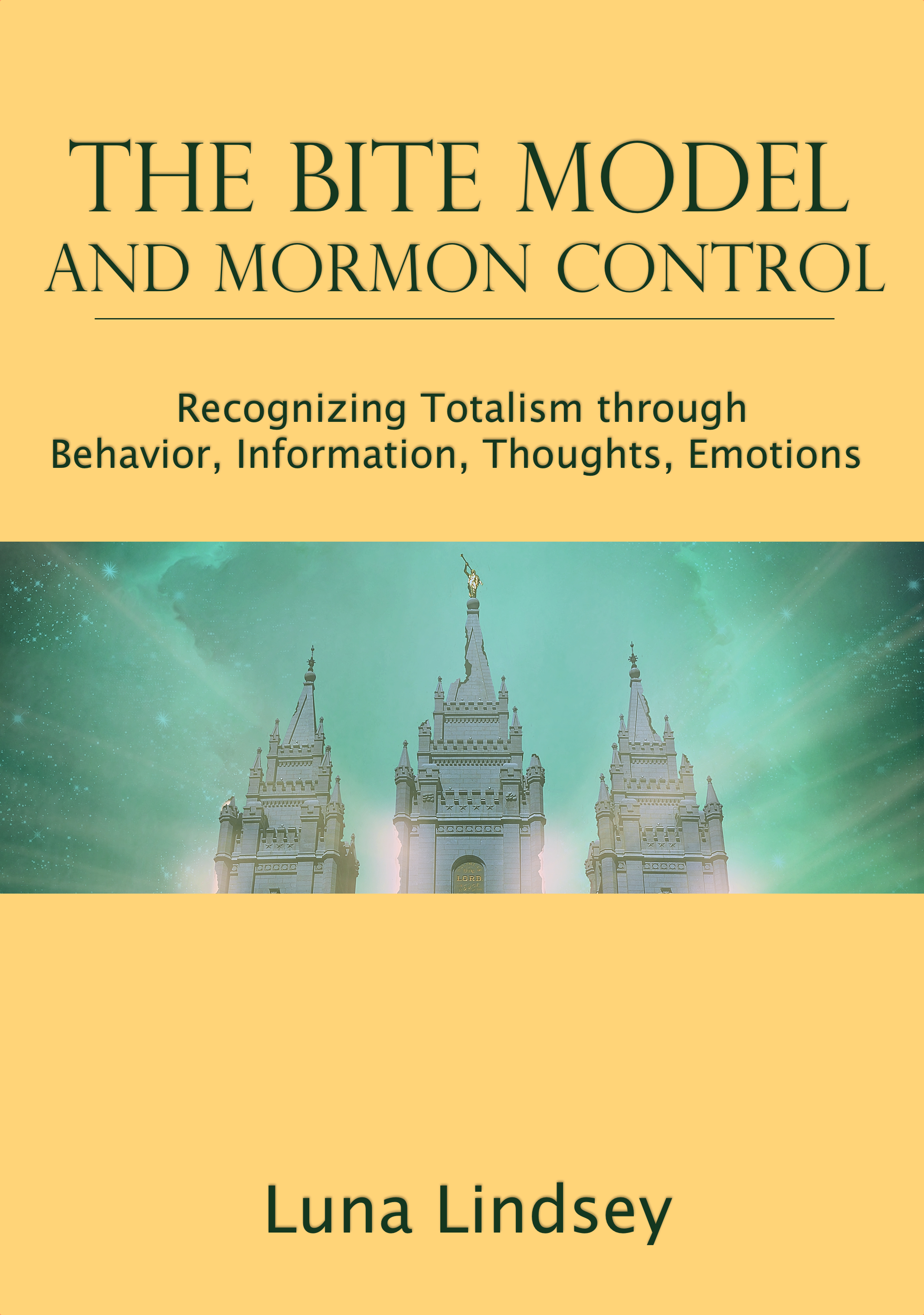Related: A complete list of LDS Commandments
Mormons like to pride themselves on being one of the few groups in the world to hold such high standards. Yet this is something common among cults. The standards may vary from group to group, but generally the focus is on behaviors accepted as positive by the rest of the world. Most people have some kind of ideals, so this serves the purpose of attracting new recruits with similar goals, as well as later tying the member to the group, and making the group look good to the outside world.
Of the Moonies, Geri-Ann Galanti says, “..they are always aware of trying to be better people.” (RfC, p 96) While still peculiar, Mormons are not so unique.
This is demand, not request, for purity. It is a command to be perfect by the group’s standards. Purity is expected, even necessary, to remain a part of the group. And since remaining a member is tied up with a whole lot of other pressures, such as existence and induced phobias, the demand for purity is very profound and intense.
It is important that these standards are held impossibly high, so that members are never able to reach the goal of what they “should” be, and as such, they never feel as if they measure up. The goals themselves are presented as possible to attain (in this life, or maybe some other one), and thus the standards never become suspect, only the member who is not meeting them. After all, God will give no commandment unto the children of men save he provide a way for them to fulfill it (1 Nephi 3:7), nor will he allow anyone to be tempted beyond that which they are able (1 Cor. 10:13).
“The demand for purity means that members will feel permanently inadequate. It keeps them in a perpetual cycle of ‘trying harder’ and yet never reaching the required goal. The net result of the practice of confession and purity is to severely limit the vast array of behaviors that people are normally allowed to express. Hence there is a behavioral restriction, or boundary, on the cultists as well.” p 210, Recovery from Cults
Common human frailties usually become targets in such systems of strict compliance. Sexuality, impure thoughts, selfish desires, the need for food, desire for leisure time, desire for sleep, all instinctual drives that are unavoidable become demonized and evil.
Sometimes the over-focus on what one should not do further stimulates the desire to do it. If I tell you now to not think of an elephant, it becomes difficult to do anything other than think of an elephant. If I warn you in a talk that by watching R-rated movies you might have impure thoughts, then you may instantly recall the passionate love scene in the movie you just saw the night before. If I constantly belabor that sex is sacred, and therefore wrong outside the bonds of marriage, sex may become something bigger in your mind than it really is, and you become incapable of thinking rationally about it.
It’s like waving a chocolate bar in front of a child, and then telling them they can’t have it.
It is easy to equate worthiness to self-esteem, and when the commandments are so strict, it can be impossible for a person to separate these two concepts. Perpetually falling short, a person can feel worthless in the sight of God and his fellows. This gives the organization more power to control, as the person keeps striving for something they can never attain.
This leads to the double-bind principle, and also to the guilt/shame dynamic, both of which will be discussed in their own sections.
Holding impossibly high standards serves another purpose. Each member knows exactly how difficult it is to live the commandments. When a member then sees someone leave the Church, an easy assumption is that the apostate has succumbed to the forces that the member is (barely) able to resist. In judging them, the member feels elevated, and just a little closer to that elusive goal of perfection.
A socialist political cult leader stated: “We do not indulge our faults, we rectify them; we do not justify errors, we overcome them. Ours is a hard calling and a stern discipline: It is also liberation.” (RfC, p 67) This is very similar to Mormon concepts, that through faith in Christ weak things will become strong. (Ether 12:27) That Jesus “never said it would be easy, I only said it would be worth it.” That obedience to Gospel principles is the only path to freedom. (2 Nephi 2:27)
The amount of material available from Church sources “Demanding Purity” is overwhelming. Here are just a few examples.
“And we will prove them herewith, to see if they will do all things whatsoever the Lord their God shall command them.” Abraham 3:25
“And no unclean thing can enter into his kingdom; therefore nothing entereth into his rest save it be those who have washed their garments in my blood, because of their faith, and the repentance of all their sins, and their faithfulness unto the end.” 3 Nephi 27:19
“Touch Not Their Unclean Things. Too many Latter-day Saints today somehow believe they can stand with one hand touching the walls of the temple while the other hand fondles the unclean things of the world. We can’t do that. As Alma said, ‘Touch not their unclean things’ (Alma 5:57). I plead with you, put both hands on the temple. Put your arms around the temple, and hang on for dear life to your family dream. If you don’t, the tigers will come at night and tear your dreams apart.” Elder Bruce C. Hafen, Your Longing for Family Joy, Ensign, Oct. 2003
“Satan would have you believe that happiness comes only as you surrender to his enticement to self-indulgence. We need only to look at the shattered lives of those who violate God’s laws to know why Satan is called the father of all lies’…
“You can avoid the burden of guilt and sin and all of the attending heartaches if you will but heed the standards provided you through the teachings of the Lord and His servants….
“We pray that you—the young and rising generation—will keep your bodies and minds clean, free from the contaminations of the world, that you will be fit and pure vessels to bear triumphantly the responsibilities of the kingdom of God in preparation for the second coming of our Savior.” For the Strength of Youth pamphlet issued by the First Presidency.
An oft sung hymn, “More Holiness Give Me”, lists 23 attributes we should have, and concludes that we should be like Christ, who was perfect. Verse three, in its entirety:
More purity give me,
More strength to o’ercome,
More freedom from earth-stains,
More longing for home.
More fit for the kingdom,
More used would I be,
More blessed and holy—
More, Savior, like thee.
One part of the Threefold Mission of the Church is “Perfecting the Saints”. “Be ye therefore perfect, even as your Father which is in heaven is perfect,” (Matthew 5:48) is oft quoted in the Church.
“A standard is a rule of measure by which one determines exactness or perfection. The Saints are to be a standard of holiness for the world to see! That is the beauty of Zion.” First Presidency Message “Strengthen Thy Stakes”
Ezra Taft Benson, Ensign, Jan. 1991
“The only way to purify our hearts is to receive the ordinances of the gospel and follow the Master in word, deed, and thought.” Visiting Teaching Message: More Purity Give Me, Ensign, Sept. 1995
“It is a challenge to work in the world and live above its filth… Brethren, be strong. Rise above the evils of the world.” Gordon B. Hinckley, The Shepherds of the Flock, Ensign, May 1999
“One of the saddest experiences of life is when we must watch someone we love break the commandments and follow ways that lead to unhappiness. As parents, we can help to protect our children from following such a course by teaching them early that the commandments are one of the greatest gifts our Father in Heaven provided for us during our stay in mortality. They are guidelines to happy living. They protect us from all the serious pitfalls of life. They are the pathway to peace and joy.”
The Young Women’s theme is repeated weekly in a group setting by all girls ages 12-18.
“We are daughters of our Heavenly Father, who loves us, and we love Him. We will ‘stand as witnesses of God at all times and in all things, and in all places’ (Mosiah 18:9) as we strive to live the Young Women values, which are:
Faith
Divine Nature
Individual Worth
Knowledge
Choice and Accountability
Good Works, and
Integrity.
We believe as we come to accept and act upon these values, we will be prepared to strengthen home and family, make and keep sacred covenants, receive the ordinances of the temple, and enjoy the blessings of exaltation.”
“Many people find the commandment ‘be ye perfect’ to be overwhelming. Youth especially can get discouraged easily when they make mistakes. They may feel that perfection is unattainable and thus not worth working toward. We all need to realize that perfection in this life is not expected or even possible. What is expected is that we try each day to be better than we were the day before. Help class members understand that they will someday reach perfection if they strive for it as best they can from day to day.” Preparing for Exaltation, Lesson 22: Striving for Perfection
“The first commandment: Thou shalt be morally clean and conform to every standard of virtue and chastity.
“…People who live after the manner of the world are immoral and unclean–so much so that we sometimes wonder whether there are any moral standards left among men. People speak of a new morality, which is, in fact, immorality under a new name. We are confronted on every hand–on radio, on television, in the movies, and in the so-called literature that is available–with a recitation of standards that are contrary to gospel principles. They are inherent in the course that the world pursues….
“…The second commandment: Thou shalt bridle thy passions and abstain from all manner of lasciviousness.
“…We are here in mortality to be tried and tested; we are on probation. The great test is whether we overcome the lusts of the flesh, flee from that which is lewd, and live by gospel standards. We are to overcome the world. If we get involved in necking and petting, if we go to pornographic movies, if we read trashy and vulgar books or magazines, if we tell or enjoy vulgar stories, if we profane and are unclean in thought or word, we are living after the manner of the world. Then there is nothing peculiar about us. We are as the generality of mankind. We are outside the family circle. We lose our status as the sons and daughters of our Lord.” The Ten Commandments of a Peculiar People, Bruce R. McConkie, Address given at BYU, Jan 1975.
Read more about Demand for Purity in my book, Recovering Agency: Lifting the Veil of Mormon Mind Control.



